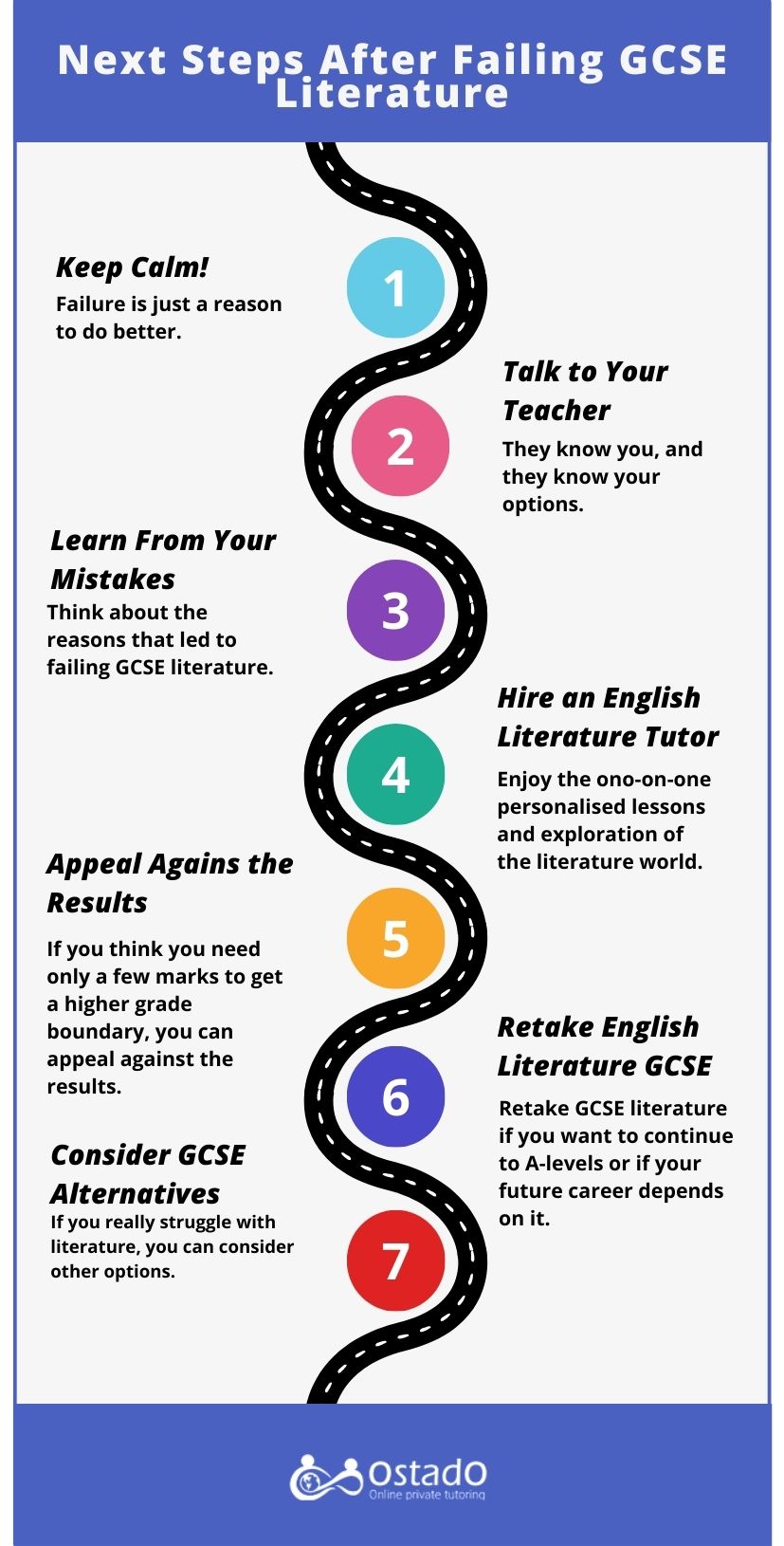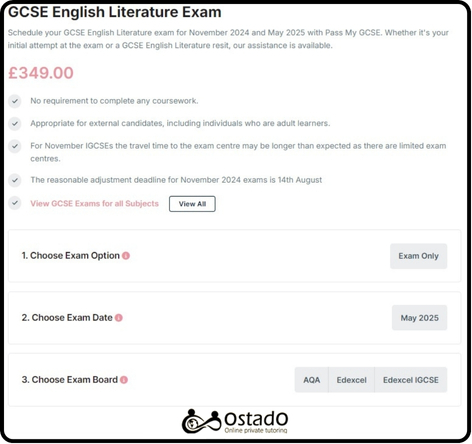Whether it’s a must to retake GCSE literature if you fail or not has caused a lot of confusion for students. It’s even worse when you don’t know what steps to take if you fail GCSE English literature.
The short of it is that English literature is not a core subject, but the English language is. Therefore, you don’t have to retake English Lit if you fail it. However, if you plan to do English literature at A-level, you must retake it.
Understanding Your GCSE English Results
You need at least a grade 4 (standard pass) to pass the GCSE exams. In the case of English GCSEs, which consist of English literature and English language as two separate GCSEs, you need a grade 4 in one of them. Therefore:
- In the best-case scenario, you pass both English GCSEs with a high grade.
- If you get a grade of 4 or higher in English and fail English literature, you don’t have to do anything.
- If you get a grade of 4 or higher in English literature and fail the English language, you don’t have to do anything.
- In the worst-case scenario, you fail both exams. In this case, you must retake English Language GCSE. Of course, you can retake both GCSE English exams, but you can’t only take GCSE literature.
Next Steps After Failing
Failure is quite common in our lives; what’s rare is persistence. And it’s up to you how to interpret your failure in Literature GCSE. Let me tell you that moaning, groaning, or blaming others will even waste more of your time and make you more irritable. Instead, you should get on your feet and take the dilemma by the horns.
Here’s what you can do if you fail GCSE literature.

1. Blow off some steam!
What’s done is done! You can’t change the past, but you can plan for the future. Take your mind off GCSEs altogether for a couple of days. Hang out with friends, watch movies, read a book, or play a video game. These help you refresh your mind and make sound decisions.
2. Get Counsel From Your Teacher
You can’t put a price on the support and empathy of your teachers in times like this. Talk to them, and they’ll be happy to discuss your options and tell you what steps you can take.
3. Reflect on the Previous Results
Think about the reasons why you failed the literature GCSE. Was it because you didn’t have a good revision plan, or you didn’t attend literature classes, or it was simply out of your hands?
Sometimes, the problem is as fundamental as not reading the question thoroughly and giving an irrelevant answer. Sometimes, failure is due to a lack of GCSE test-taking strategies, like time management.
I have also elaborated on revision techniques you can adopt to make literature revision more productive. Click on “How To Revise for GCSE Poetry” to learn more.
4. Hire an English Language/Literature Tutor
English literature is full of fantastic thoughts and ideas from great writers, poets, and playwrights. Shakespeare is the perfect example of all these titles. However, you can’t enjoy something you don’t understand, especially when virtually all language used in literature and poetry is indirect.
If you’re not a fan of literature or reading in general, literature GCSE tutors can change your opinion and explore the works of literature covered at the GCSE level with you. They can teach you personalised lessons that match your learning style and adjust the class pace based on your needs.
5. Appeal Against the Results
Appealing against the results is one of your options if you fail GCSE literature by a small margin. Do this only if you’re sure that you only need a few marks to pass the exam. It requires a good understanding of your exam boards’ marking schemes and grade boundaries.
Since GCSE Literature isn’t a core subject, you have to pay the price for remarking your papers yourself. But it’s best to consult this with your teacher first.
Note that, in remarking your paper, your grade might go up as well as down. The previous examiner may have been generous with the marks, and the new examiner might adjust the grades for accuracy.
Click here to learn about the procedure for appealing against a GCSE.
6. Retaking English Literature GCSE
Although it’s not required that you retake the literature GCSE, you might want to retake the exam for several reasons.
- Generally, retaking English literature GCSE opens new doors in your educational journey and career prospects.
- Besides the compulsory GCSE subjects (GCSE Maths and English), you need to do at least three more GCSEs to qualify for A-levels. Choosing English literature is a sensible option since it’s closely related to one of the compulsory subjects, making it potentially easier.
- GCSE literature is an exhilarating subject that familiarises you with works of literary giants in different literary periods.
- Studying literature develops critical thinking and analytical skills. These skills are essential if you want to study Journalism, History, Law, Media Studies, and Religious Studies in Higher Education. Naturally, if you aim to have a career in these fields, you also need to retake English Literature.
- Literature is not a core subject according to the Department of Education, but some colleges and sixth forms demand a pass in GCSE English Literature.
7. Consider GCSE Alternatives
If you retook literature GCSE and failed again, you can consider alternatives to GCSE. Of course, there is no limit regarding how many times you can retake GCSE English literature. You can retake it as many times as it takes to achieve your desired results.
One alternative is Functional Skills Qualification. However, literature doesn’t fit in the area of Functional Skills Qualifications, but you can try Functional Skills English as an alternative to GCSE English language.
My colleague Saba has written a post on what alternatives to GCSEs are and how you can take them. Click on “Alternatives to GCSE” to learn more.
How To Retake GCSE Literature
Retaking a GCSE exam shows determination and commitment to your goals. In order to retake Literature GCSE, you should take the following steps:
- Discuss your intention with your school: They might support your retake, or at least they can give you guidelines on the requirements of the exam board you’re registered with. If you aim to retake the exam with a different exam board, you should see if it’s OK with your school policy. If your school doesn’t support the retake, you’ll have to register as a private candidate and retake the exam in the nearest exam centre.
- Register for the exam: Then you have to book a GCSE English Literature Exam. Here, you can choose the exam board and the exam date. Retaking English literature is only available in the summer. So you’ll have to book the exam for next May. You must also pay the exam fee of £349.00.

Fees of retaking GCSE English literature - Prepare for the exam: One of the good things about retaking an exam is the experience and familiarity with the exam format, question styles, marking schemes and grade boundaries. Reflect on your experience and learn from your mistakes. All you need is a comprehensive and realistic revision plan. You can download free revision timetable templates to organise and track your revision plan.
- Attend the exam session: Make sure to find out the exact time and location of the exam in advance. Be there 10 to 15 minutes earlier to ease yourself into the exam setting. Make sure you have valid ID documents with you.
FAQs - Retaking English Lit
- Do you have to resist the English language if you pass literature?No, you don't. If you pass GCSE English literature but fail the English language, you don't have to do anything. However, since English GCSE is a core subject and many colleges, sixth forms, and even employers demand a pass in English GCSE, you might want to resit English language GCSE.
- Do you have to pass both English GCSEs?It's not a must to pass both English GCSEs, but it definitely makes you look better for college applications and gives you wider choices regarding higher education.
- What happens if you fail English literature GCSE?English literature GCSE is not a core subject, and if you pass the English language GCSE, you don't have to retake English lit. However, some schools or colleges may demand a pass in GCSE literature, although it's not required, according to the Department of Education.
- What are the GCSE English Language and Literature pass rates?According to a poll in 2022, 77.5% of the students got a GCSE grade of 4/C or above in English literature, and about 70% of the students got 4/C or above in English language.
- Is the English Language GCSE more important than literature?GCSE English language assesses your ability to communicate effectively and extract the meaning of a text, among other things. This is what matters to universities and employers rather than literary knowledge. So, we could say that the English language is generally more important than literature. Nonetheless, it depends on what you wish to study for higher education.

